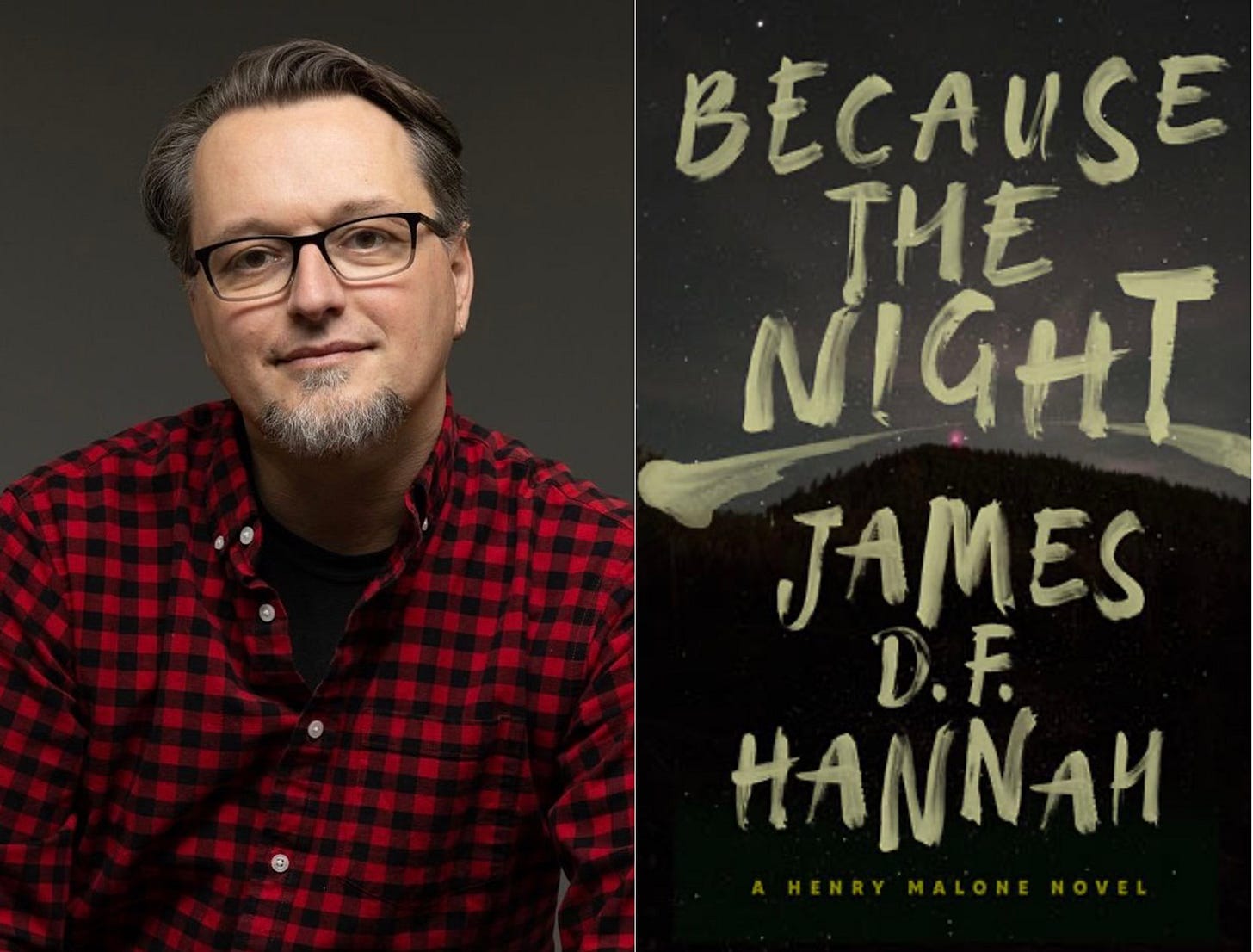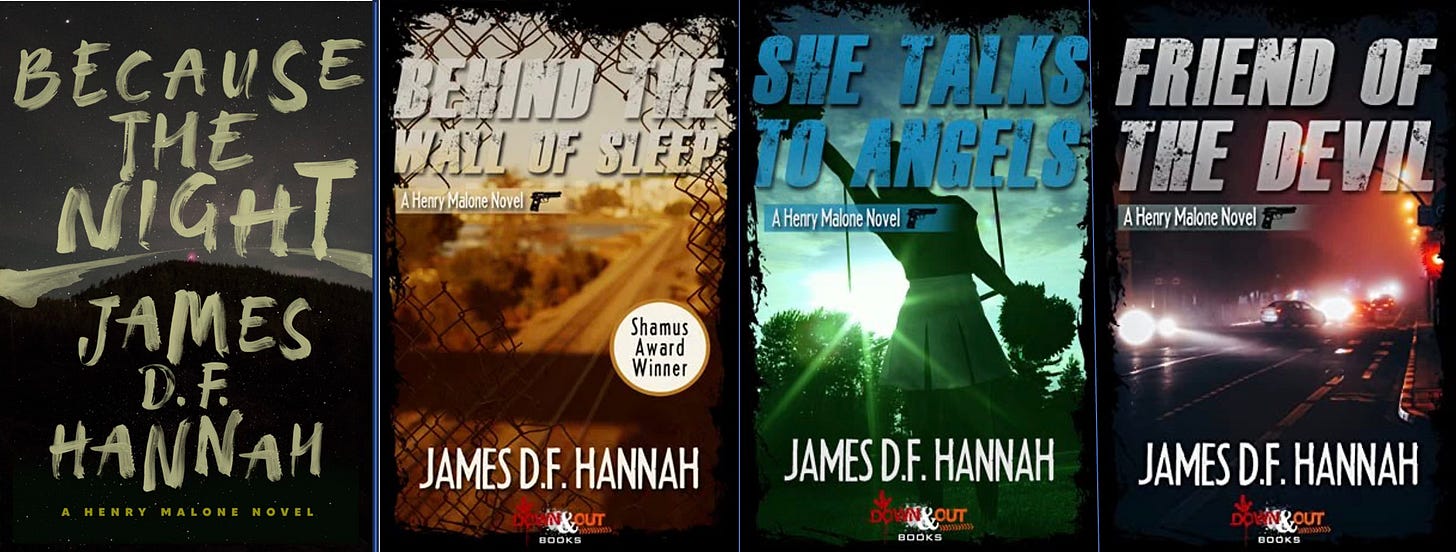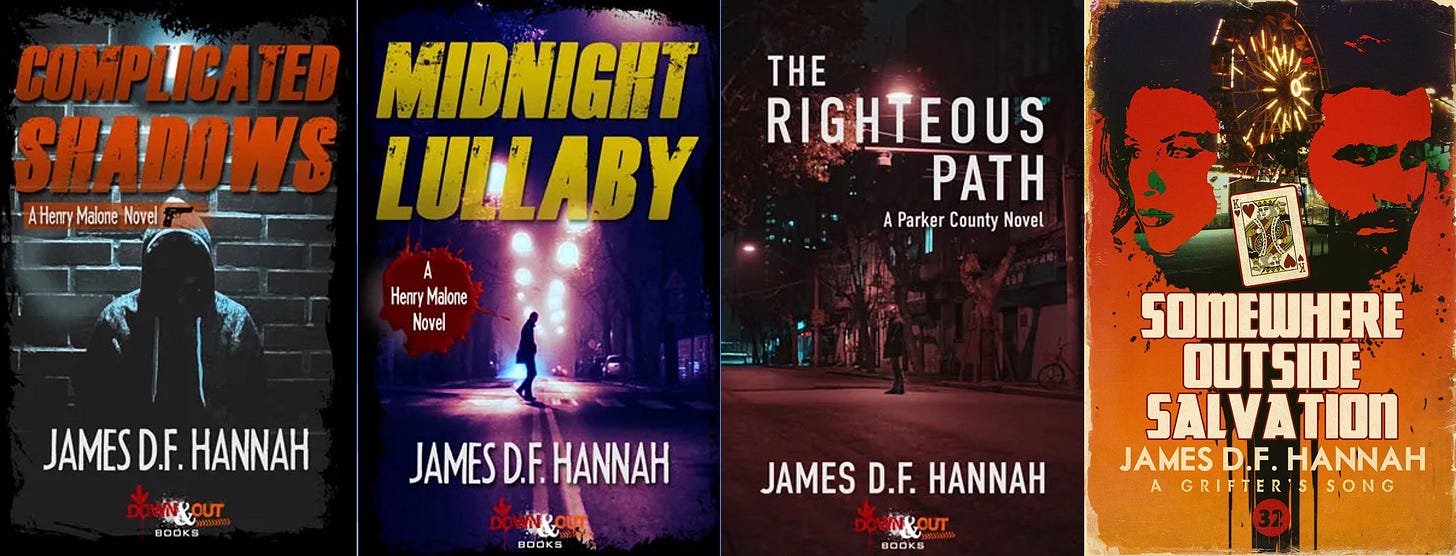A short bio to get us started (readers told me they wanted the ‘deets’).
James D.F. Hannah was a journalist and columnist, before moving into government public relations. He lives in Louisville, Kentucky. He’s been nominated for multiple awards, and won the Shamus Award (from Private Eye Writers of America) for best paperback with Behind the Wall of Sleep, a Henry Malone novel.
I started reading James D.F. Hannah’s books in reverse order. I read Because the Night (2023), the sixth Henry Malone novel, before all the others. This happens to me frequently. I’ll enjoy a book, be curious about the author, discover there’s a series, then hurry to catch up on what I’ve been missing.
In James’s case, I knew his short fiction already, the crisp writing and immersive plots. My favorite kind of crime stories. And Henry Malone is a private detective … you all know my proclivities.
So, I was thrilled when James agreed to play the conversation game. Here’s what we came up with.
M.E. Proctor: Detective fiction. I have a special interest in it, as you know, and I’m always curious to hear what other writers think about the genre and why they’re attracted to it. And why they’re sticking to it. Your PI, Henry Malone, has six books on his resume.
James D.F. Hannah: First of all, thanks for inviting me to chat. To know me is to know I love to talk!
Why I choose to write crime fiction is fairly simple: I grew up reading crime fiction, loving the genre, and from a fairly early age, I knew I wanted to write it. Like a lot of us, I read the Hardy Boys, The Three Investigators, Encyclopedia Brown—real heads remember the McGurk Organization books—and then I moved on to a lot of PI fiction. Chandler and Hammett (obviously), Block, Parker, Macdonald and MacDonald (Ross and John D., respectively), Paretsky, Estleman, Grafton ... you name it.
I grew up in eastern Kentucky and southern West Virginia, and I hadn't really seen that region represented much in crime fiction. When I got serious about writing a book, I decided to take the tropes I loved—the knight in tarnished armor, the benevolent sociopath sidekick, wealthy people hiding terrible secrets—and move them away from an urban landscape like L.A., New York, Boston or Chicago, and set the book in an environment I understood. The challenge became figuring out how to write a PI novel where everything took place in the hollers and hills and one-stoplight towns of Appalachia.
As I dug into the tropes of the PI novel, I also wanted to play with them. For example, like a lot of literary PIs, Henry is a recovering alcoholic. I wanted to explore that journey, so I made his sidekick, Woody, his AA sponsor. Henry is emotionally broken in the early books, and I didn't want him to be infallible. He really can't fight, he isn't a great shot, he's not inclined to quoting poetry or great literature. He's a grumpy guy who resists doing the right thing until the moment he decides he has to. I also made Woody the more stable, more prepared of the two. I joke that the books are set up where the character who'd normally be the sidekick is the hero, and then Jack Reacher is the sidekick. Woody is also Henry's moral voice, the one pushing him to be a better person, and one of the things I love the most is the banter and arguments between them.
M.E.: Midnight Lullaby is the first Henry Malone book. Within a few chapters, we know where we are. It’s West Virginia (Parker County, fictional), but the writing is classic hardboiled. Malone by the way of Marlowe. Snappy dialogue, a sleazy lawyer (Henry hates him at first whiff), a hint of femme fatale. What came first: Henry or the story?
J.D.F.H.: A couple of fun things here. The first book I started writing wasn't what Midnight Lullaby became. It was what I thought of as a redneck James Ellroy novel, with multiple protagonists who converge to a common point. Sort of a Holler Confidential. But as I worked on the book, I found the plot thread I was most interested in was the one with this ex-state trooper, who looked for a missing woman. I ended up stripping out everything else and focusing on Henry. In many ways, one kind of created the other, though I'm not sure where the starting point was. I let Henry talk and then I followed him where he was going, and that's when I began bringing in all the PI tropes.
About Henry: He's me. I'm a little less grumpy, I'm a little better read, and I still have all my fingers, but Henry is very much me without a filter. It's one of the things that makes writing him so easy, because I can turn off that societal censor and just let it rip. I get comments from people who know me, they'll read the books and say, "Wow, Henry reminds me of you. He's an asshole."
Obviously these people aren't getting books dedicated to them.
And so much of Midnight Lullaby was discovering it as I wrote it. Things I didn't even think about paid off somehow further down the road. For example, I mention an unnamed female deputy during one scene late in the book. When time came around to write The Righteous Path, focused on Parker County sheriff Matt Simms, that female deputy became Charlotte ‘Crash’ Landing, who has a significant role in both Behind the Wall of Sleep and Because the Night, and is the main character in the short story "Twenty Centuries."
That’s funny and very cool at the same time.
M.E.: Henry is you. Good to know! I’m with you on the “filter”. Our characters are allowed to let loose more than we do. It’s healthy, keeps us balanced, and sociable. About writing a series, CrimeReads published an interview with Rob Hart (Assassins Anonymous, Medusa Protocol) where he talks about “slipping on a comfortable pair of shoes” when writing a series. The pleasure in revisiting and going deeper. He also talks about the challenge of keeping things fresh. I think the secret of a series is bringing in new characters with an arc that supports the anchor protagonist, like Crash Landing. What do you think, about the “comfort” and the “freshness challenge”?
J.D.F.H.: I think it's a challenge to keep a series feeling fresh. For me, the highwater mark of someone keeping a series going is Ed McBain with the 87th Precinct series. He wrote that for 50 years, I think, and the characters were always changing and growing. And you're absolutely right about bringing in new characters to support the arc, so long as you're not doing a Cousin Oliver. I do believe most single-protagonist series have a fresh-by date; there are only so many stories to be told before you're playing the same beats and rhythms you've played before, and no one wants to be the person who stays at the party too long.
M.E.: I believe Henry has a few more in the tank, but it’s good to poke around, not only to keep things fresh for the reader, but also to keep the writer interested. We live with the book a lot longer than the readers do.
J.D.F.H.: It's why I'm taking a break from Henry and working on a few other things. My agent, Michelle Richter, has a book I wrote that's set in rural Kentucky during the week of the 1976 bicentennial, and it involves brothers and moonshine and cocaine. It's very much an ode to Elmore Leonard, and I'm hoping we find a home for it. I'm working on two books now: one's set in 1982, again back in Kentucky, during a coal mine strike, touching on themes of race, community, and the changing power of unions during that time; and another I'm co-writing with an author I really adore, a classic "characters on the run" story, with some interesting twists. Beyond that, I've got a short story coming up in an anthology based on the songs of Lyle Lovett—I wrote a PI story inspired by the song "North Dakota"—and then another story with Crash. That one'll be a return to Ellery Queen Mystery Magazine—always amazing when I get to show up there—sometime later this year.
As far as Henry goes, I'll eventually look to going back to the books and exploring him a few years down the road, after the end of Because the Night, see how he's been doing, find out if time's mellowed him out any (spoiler alert: probably not).
M.E.: Thank you so much for taking the time to chat. We have to compare notes on working with another author. That is definitely a change of rhythm and a way to keep storytelling fresh. Lots of fun too.
Here are a few links: James D.F. Hannah’s Website https://www.jamesdfhannah.com
His Substack at That Noise at 2 AM (I warmly recommend!)
And the books:
The Henry Malone Series:
Midnight Lullaby
Complicated Shadows
She Talks to Angels
Friend of the Devil
Behind the Wall of Sleep
Because the Night
Parker County:
A Grifter’s Song:
Till next time, friends…





Interesting stuff...as usual. Enjoyed it. Thanks, James Patrick Focarile
Great interview! I do the same thing with new author/book discoveries and backtrack.